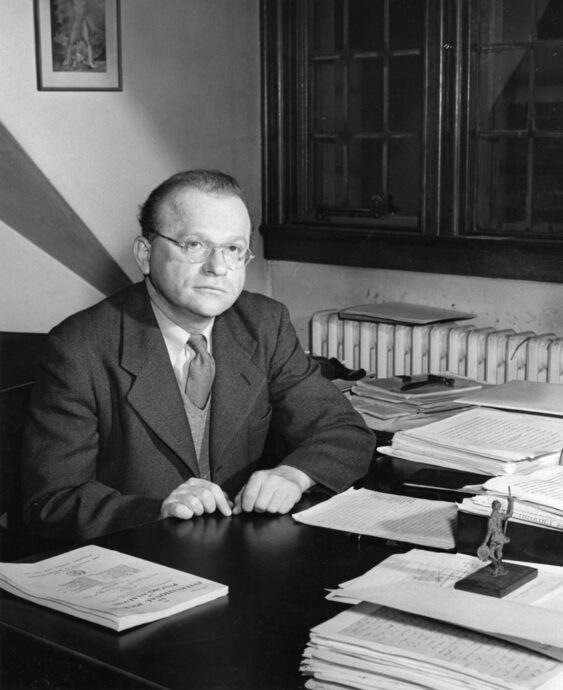Even the errors of anti-liberal Catholics now have rights.
Ideological Denigration of “Mass Society”
It would be a shame if the teachings of American sociologist Edward Shils faded out of discourse in the humanities and social sciences. Shils, who died in 1995, was considered one of the leading social scientists, and among the most learned people in the world. He grew up in Philadelphia, where his father, a Jewish immigrant from Russia, worked in a cigar factory. He was a Distinguished Service Professor at The University of Chicago and a Fellow of Peterhouse, Cambridge. His physical bearing and manner were likened by a student to those of a longshoreman. (Disclosure: Shils was my PhD dissertation supervisor and later on, a cherished friend.)
He detested pretense and had a deep respect for the common sense residing in the middle and lower classes of society. In Chicago, Shils admired Mayor Daley’s political machine, which he saw as a mechanism directly connecting local citizens to authorities, and a bulwark of civility against progressive ideology. Television was an “open sewer;” media experts who were “into communications” came under withering ridicule.
Shils devoted much of his attention to the study of intellectuals and the distribution of knowledge in society. Yet he had little respect for the sub-field of the “sociology of knowledge,” which he found deterministic and contradictory. If ideas are simply reflective of one’s social position, what about the integrity of that idea itself? In the first pages of one of Shils’s volumes of collected essays, The Intellectuals and the Powers, he reflected on why intellectuals tended to feel revulsion for their own societies, and how privileged ideologues both blamed those of lower social status for failing to appreciate cultural standards, and for failing to embrace schemes for transforming society in ways elites wanted. He noted “condescending and bitter abuse” by intellectuals, who seemed to be “taking revenge on the working and middle classes for not having measured up to their unrealistic and uninvited expectations.”
The tendency of Western intellectuals to denigrate the culture and morals of the middle and working classes, Shils suggested, owes much to the distinction made by 19th century German sociologists between Gemeinschaft (community) and Gesellschaft (society). These were ideal-typical formulations that emerged in the effort to understand modern industrial societies in contrast to traditional ones, and gave shape to distaste for the culture market forces produced when workers had enough time and money to enjoy it. Shils found descriptions of Gesellschaft, the society of modernity, generally pejorative: It was envisioned as “the evaporation of moral bonds, the shriveling of kinship and traditional institutions and beliefs, and the isolation of the individual from his fellows” in modern Western society.
This negative image was reinforced by an idealization of the traditional community (which may be observed in the way some today think of the ancient Greek polis) as the “right ordering of life”—“an entirely consensual, perfectly integrated, small-scale society, permeated by a set of common theological beliefs which give meaning to every aspect of life.”
According to Shils, the elite creators and patrons of the term “mass society” “stressed alienation, belieflessness, atomization, amorality, conformism, rootless homogeneity, moral emptiness, facelessness, egoism, the utter evaporation of any kind of loyalty.” He found in this posture an “indissoluble residue of Marxism.” Self-appointed Marxist vanguards of a revolutionary transformation of society were invariably disappointed in the working class. They were “affronted by the waywardness of the mass of the population. … The classes from whom intellectuals expected a heroic awareness of grandiose events and an eagerness to participate in them concern themselves at best with the routine philistine life of bourgeois politics.” Intellectuals worried that members of the working classes are uninterested in the “great dream of a transfigured humanity.” They saw popular culture as escapist.
Shils had mainly socialist intellectuals in mind, but today criticisms of popular culture are a window on the growing confluence of left- and right-political orientations, both favoring more state intervention to shape the moral orientations of citizens. A longing for moral unity and order, a fundamental sense of unease with the individualism and disrespect for authority that typify American society is palpable today, sometimes leading thinkers to question basic constitutional rights and freedoms. Lately, there is much written about the “dismantlement” of cultural norms, and what “integralist” author Sohrab Ahmari called the “abject degeneracy” of modern democratic societies, supposedly as a result of liberalism and constitutional rights. Modern, liberal democratic societies are commonly considered to lack order and meaning, a consequence of the state’s “viewpoint neutrality.”
If Edward Shils were around today, he would have faith that Middle America will not fall victim to intellectual fads like Critical Race Theory or Ideological Transgenderism.
While leftists have bemoaned the failure of the masses to respond to the allure of socialism, the denigration of average Americans has taken a new form in the thought of elite thinkers seeking to lead populist revolts. In his new book Regime Change, Patrick Deneen poses as a defender of “ordinary people,” but the book actually reveals his contempt for those categorized as such. Deneen writes that “the foundations of society have been eroded,” citing pharmaceutical addiction, “electronic distractions,” and the “prevalence of a dull ennui and psychic despair,” a culture of consumer goods and experiences, and “memes.” But “the many,” the “demos,” who are a “servant class” to the elite, “ruling class,” and who silently resent how these conditions have been imposed on them by elites, are ready to be led toward moral redemption by a new elite, championing the common good, acting on their behalf. Vanquishing progressive elites and irradicating their influence, a new, Christian, political elite needs to forcibly impose “boundaries” to order the lives of the “ordinary people,” consistent, it seems, with the principle of in loco parentis. The “ordinary people,” having been led like cattle into corrupt, secular value-relativism by progressive elites, need to be led back to traditional, Gemeinschaft-type values by a conservative vanguard.
Indeed, what Shils termed an “indissoluble residue of Marxism” comes into focus, attached to a form of conservative progressivism. As Shils understood, the people of middle America are no more likely to fall in behind such non-elite calls to redeem themselves than they were to agitation by generations of communist and socialist intellectuals who likewise saw them as a plastic, monolithic, malleable mass that could bring ambitious ideologues to power.
The perception of Deneen and others who bemoan the putative secular immorality of American elites has perhaps been clouded by projecting their parochial perceptions of college campus life, and the ways of liberal arts undergraduates and tenured radicals, upon the society as a whole.
The Internet also distorts perception of levels of moral deviance. Randomly occurring, diffuse scandals are collected in ideologically edited news aggregation sites and presented as representative of general social and moral chaos. Only a handful of writers adhere to movements like Integralism, yet the Internet amplifies intellectual chatter by the symbol-manipulating class that is unknown, or meaningless to most citizens.
Immediate contact with local communities rarely confirms either leftist or conservative stereotypes of mass society. Some no-elite people in America may conform to Deneen’s projections of his value system, but others do not; the society is not simply polarized; it is increasingly differentiated. Women and men are independent and, reflecting immigration, increasingly diverse in terms of ethnicity, religious, and political orientation. And yet, despite this pluralism, it appears that most tend to live and make moral decisions based on fixed points of reference. In fact, America is among the most religious of wealthy industrialized societies. Gallup polls have shown that around half of American citizens would not vote for a professed atheist for president. According to Pew Foundation research, while “absolute certainty” about the existence of God has declined, 89 percent do believe in God, more than in any other industrialized society.
Shils worked in the rarified halls of elite universities, but as an empirical, as well as humanistic sociologist, he made regular forays into the ethnic communities and slums of Chicago, both to buy vegetables and also to stay in touch with the kinds of people he had served, in the 1930s, as a social worker. He understood that America has a society with only a weak center, one where freedom in civil society was the source of creativity and upward mobility. He did not expect widespread appreciation of high culture and learning, but he understood that even in what leftist social scientists called “mass society,” people and communities were held together by religious, familial, and ethnic bonds that had not been obliterated.
He was a fierce conservative, a self-professed Cold Warrior who helped establish the Congress for Cultural Freedom to give voice to European intellectuals resisting the allure of communism. I think if Shils were around today, he would have faith that Middle America will not fall victim to intellectual fads like Critical Race Theory or Ideological Transgenderism. Liberty and secularism are not our main problems; our problems stem from declining educational standards, and resulting disrespect for civic traditions (in fact, Shils wrote a powerful book, Tradition, on the phenomenon itself). Beliefs about sacred things take root in a society where freedom of conscience is protected by constitutional rights, more so than in those where state authorities define moral boundaries. I imagine Shils agreed with Tocqueville, who found that in American democracy, the exercise of rights reveals not an antisocial force but a merging of a sense of liberty and a civic spirit.



